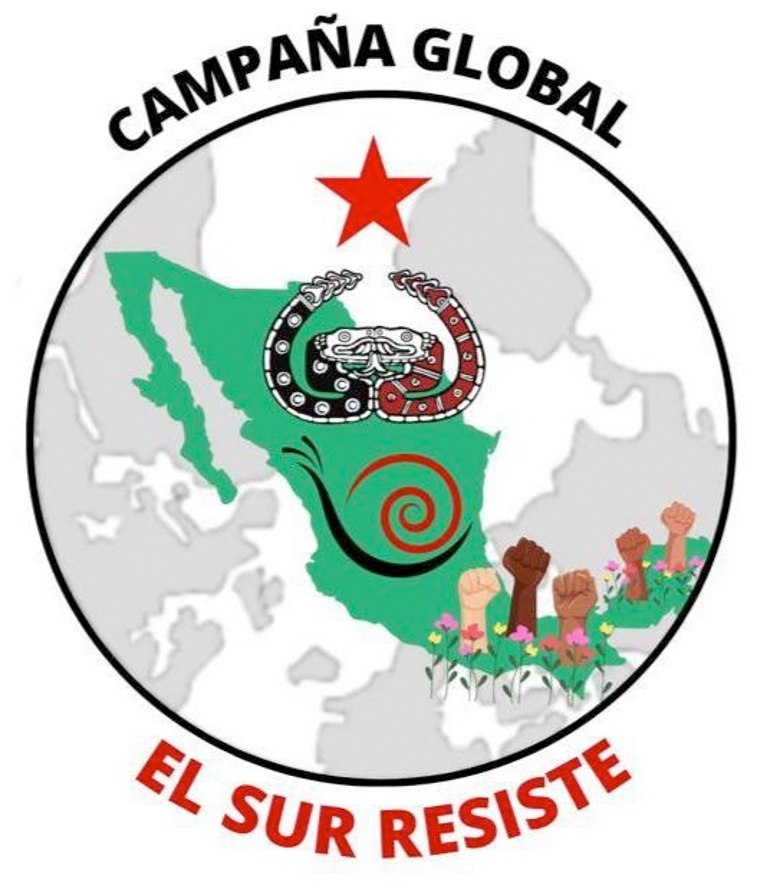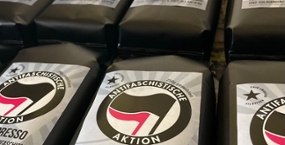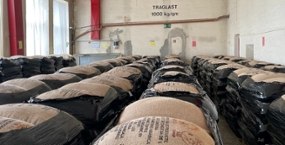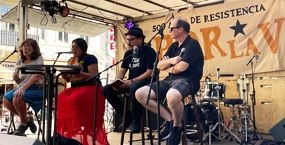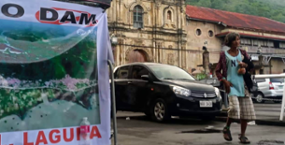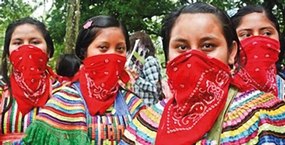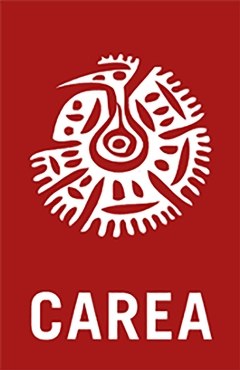Rebellious Europe trip goes Schanzenfest
Indigenous activists on situation in Chiapas und Mexiko
On Saturday, September 9th, 2023, more than 10 000 people celebrated a self-organised street party in Hamburg's Schanzenviertel. Besides live music stages, sound systems and info booths, there were statements regarding forest squats, antifascist protest on October 3rd, against the criminalisation of sea rescue and reports of people suffering from the murderous border regime. Having lost relatives attempting to cross the Mediterranean, one person called for support for collective remembrance on the Greek island Kythira.
Part of this event was a one-hour assembly featuring Amaydali M. of CNI and Pedro F. of the Chiapas organisation FrayBa. The delegation is travelling to Europe to create a critical public opinion concerning the current situation in Mexico. From the perspective of the human rights centre Fray Bartolomé de Las Casas (FrayBa), Pedro reported increasing violence in the country, tensions and repression, and more frequent attacks on Zapatistas. Amaydali was talking about the establishment and relevance of the National Indigenous Congress (Congreso Nacional Indígena), about what the CNI is doing and the demands of its members.
This article documents the assembly. It provides audio and video documentation and summarises the significant contents in written form, including additional evaluations derived from background talks with the delegation.
CNI as a platform of indigenous self-organisation
The CNI was established in 1996 on the initiative of the EZLN. Initially, it represented 44 indigenous population groups; today, are 68 groups from 28 of 32 Mexican regional states. CNI is coordinating the indigenous struggles all over Mexico. Women are fighting and resisting alongside men. They are seizing on Zapatista women's maxim, also fixed in the Women's Law (Ley de las mujeres que luchan): „¡Sin las mujeres no hay revolución!“ – „There is no revolution without women!“
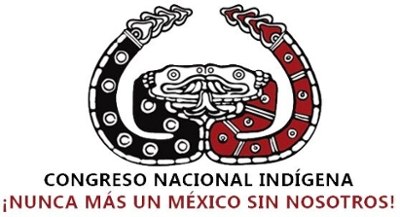
The CNI doesn't believe in the government but is presenting a mirror to their actions, denouncing their crimes and the crimes they are responsible for: land grabs and environmental destruction, femicides, murders and vanishing of activists. Despite a nearly complete lack of public attention, more and more refugees on their way to the US suffer from this situation. Self-organisation from below and creating a critical counter-public sphere are still required to increase visibility.
Increasing violence and „civilising crisis“
Economic, governmental and para-military violence have been constants in the Mexican state of affairs for a long time. By now, the extent of violence is so massive that – according to the delegation – it is no longer sufficient to denounce the surge of violence. A benchmark in development is apparent, which the comrades understand as a „civilising crisis“. It encompasses society as a whole on the one hand and still concerns the poor and indigenous population strata first and foremost.
According to Pedro of Frayba, the basis of this is an „evil triangle“ of government, organised crime and corporations. This constitutes the current design of an exploitative capitalist system to be overcome to defend the indigenous communities and fight for dignity for everyone.
However, the country's militarisation is proceeding; resistant movements are attacked and criminalised. Additionally, alleged social policy programs are implemented to privatise collective land and to divide the communities. Simultaneously, mega-projects are promoted determinedly as infrastructure for capitalist land grabs and exploitation.
The hidden war against indigenous communities in Chiapas
There is a long and bloody tradition of repression against resistant indigenous communities in Mexico. This comprises not merely of visible action of governmental security authorities, including police, military and judicial forces, but also para-military operations while simultaneously denying this collaboration and the government's responsibility.
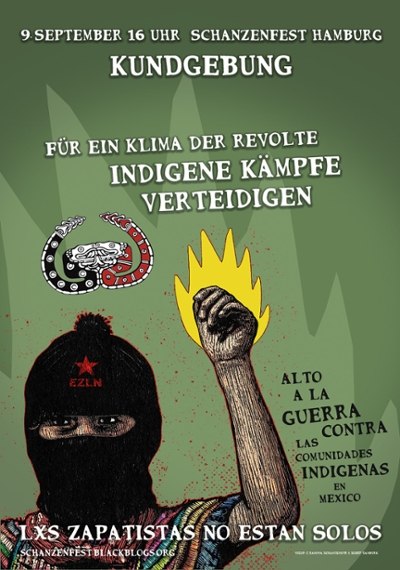
However, the Mexican government is denying a war in Chiapas and is characterising these incidents as quarrels between indigenous groups. The CNI delegation, on the other hand, emphasises the responsibility of the government and its policies and the active participation of various official authorities. Two Zapatista comrades, Manuel Gómez and José Díaz, are in jail because of dubious allegations, including a murder charge, despite their innocence being evident for quite some time. Therefore, human rights organisations evaluate these continuing imprisonments as political repression and a part of the hidden war against indigenous communities, against the Zapatistas.
Regarding the para-militaries, the delegation has stated some developments. Since the 1990s, the Mexican state has deployed paramilitary units as an anti-riot strategy – like in other Latin American countries. These covert connections have become even more opaque, complicating the task of unequivocally relating these activities to the government. Moreover, there has been an increased intermixture of armed forces, organised crime and other interest groups. The activists are, therefore, classifying the recent violence as succession activities about „classic“ paramilitaries.
Numerous violent acts of ORCAO (regional organisation of coffee farmers from Ocosingo), like the armed attack on the Zapatista community Moisés y Gandhi on May 22nd this year, resulting in a compañero Zapatista getting shot and severely wounded, serve as a recent example for the situation in Chiapas.
Social policy programs as a capitalist land grab
The government's social policy programs are aggravating the indigenous communities' situation, the CNI delegation reports. They are extending governmental control, advancing land privatisation and promoting conflicts between and within communities.
In Mexico, there is a long tradition of clientelist government policy to perpetuate political power and influence under the long-lasting PRI or, recently, under PAN. This tradition continues under the current presidency of López Obrador of the allegedly left-wing MORENA party. They are seizing on the population's existential needs populistically using social-political measures. The government can successfully secure widespread consent as the fundamental structures of poverty production remain unchanged.
From an indigenous perspective, programs linking state benefits to land ownership are mainly to be understood as an attack on autonomy. As activists have emphasised at the assembly, Mexican indigenes understand land as common property to be cultivated collectively beyond private property logic. The Zapatista project in Chiapas is based on re-appropriating colonially expropriated common ground as a base of autonomy and self-organisation.
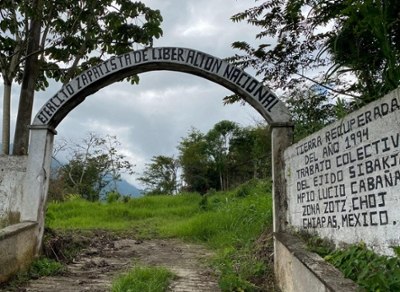
Counterinsurgency on both a large and small scale
Therefore, these social programs are just another type of counterinsurgency for the indigenous communities. Using privatisation and increasing conflicts, they are supposed to weaken and finally break the collective base of indigenous resistance. They are targeting the substance of resistant communities and movements opposing state control and capitalist permeation and fighting against government mega projects.
Mega project politics is part and parcel of Mexico's reason of state promoting the interest of capital and the location. While AMLO had cancelled several particularly unpopular projects like the mega airport next to Atenco und Texcoco, others prevailed, and new ones were introduced. They are advanced fiercely, like huge wind energy parks, the „Inter-oceanic Corridor“ or „Tren Maya“.
The Mexican state relies heavily on the military to enforce the necessary expropriations and ecological destruction. It has become a central pillar of the government's power after distancing itself from the police apparatus due to the half-baked fight against corruption. So, the military shouldn't be merely guarding the construction sites but taking over the patronage and the operation. This is expanding military presence but also directly mixing up the responsibilities of public administration and economic interests. Consequently, increased militarisation of already violent conditions is taking place, particularly in locations of protest movements' struggles and societal conflicts.
Tren Maya – a fuse for development
The construction of the railway line Tren Maya on the Yucatan peninsula is an example of mega projects' aggressive and repressively enforced land grab. On the one hand, questionable reforestation programs are implemented as a „green“ counterinsurgency strategy and a swath of destruction will smash through the rainforest. Millions of trees will be cut down, new tourist resorts will be established on either side of the railway line, and junctions for future exploitation of resources will be created. According to the activists, the government wants Tren Maya to be „a fuse for the economic development of the South“. South Mexican indigenes, however, are understanding Tren Maya as a frontal attack.
{{Bild:Bahntrasse}} The German railway Deutsche Bahn is participating in this project and profiting from the destruction and exploitation of the rainforest. As high-gloss advertisements are conjuring sustainability and the green future of the railway in Germany and Europe, at the same time, rainforest destruction and land grabs are enforced elsewhere. Deutsche Bahn, however, is increasingly faced with international protests and activists' criticism.
On September 9th, the day of the Schanzenfest and the CNI assembly, the finance-friendly magazine Wirtschaftswoche published an article on the project well worth reading: „Mexico aims at fuelling the economy and tourism using a 1500 kilometres-long railway line crossing the rainforest. Up-to-date satellite pictures illustrate the government's enforcement of the project against any resistance – supported by Deutsche Bahn“. The pictures show the destruction by Tren Maya over time very drastically.
Connecting the struggles from below
The CNI delegation's self-conception is illuminating the struggles being located and fought in different places but also mutually connecting us. They do not perceive the fights as an expression of local crises, but as contextualised in a global capitalist „civilisation crisis“, a crisis threatening human existence - the entire planet's collapse is at stake.
The indigenous communities in resistance do not look for an answer in government policy or would-be solutions from above but rely on massive movements from below, mutual awareness of struggles for life and creating networks as rebellious bases. „It's up to all of us to defend the territories“, wherever we live, day after day.
++++++++++++++++++
The entire assembly on September 9th, 2023 at Schanzenfest:
Audio MP3 - 57 MB
https://www.cafe-libertad.de/mediadb/CNI-Delegation_Kundgebung_HH090923.mp3
Welcome & introduction of the CNI delegates from Mexico
YouTube video 4:50 min.
https://youtu.be/mYBP6L484Ak?si=m3eMhRpcBR1IG2mk
Presentation of the human rights centre Frayba from Chiapas
YouTube video 4:51 min.
https://youtu.be/c3pV1-mGPz4?si=PpoE4yaMOJG-CYo5
Greetings from the rebellious Greece to the delegation
YouTube video 3:01 min.
https://youtu.be/slqqPeUeOnM?si=LGuEHWVoB6AzBOdz
What the struggles are – closing words of the assembly
YouTube video 1:12 min.
https://youtu.be/aIl0CIDa-xg?si=-dYXbWVAhsVUBGIg
++++++++++++++++++
INFORMATION STATEMENT: Towards the Global Action EL SUR RESISTE on October 12, 2023
„In order not to forget, to remember, to unite in the face of so much adversity, WE CALL on the Peoples, Communities, Organizations, Collectives, Cooperatives, and all expressions of social movements relating to Indigenous, Peasant, Popular, Anarchist, Feminist, Environmentalist, Human Rights Defenders, Free Media and other struggles, to organise and carry out actions on October 12 in a decentralised, organised and coordinated manner.“
Read more: elsurresiste.org
